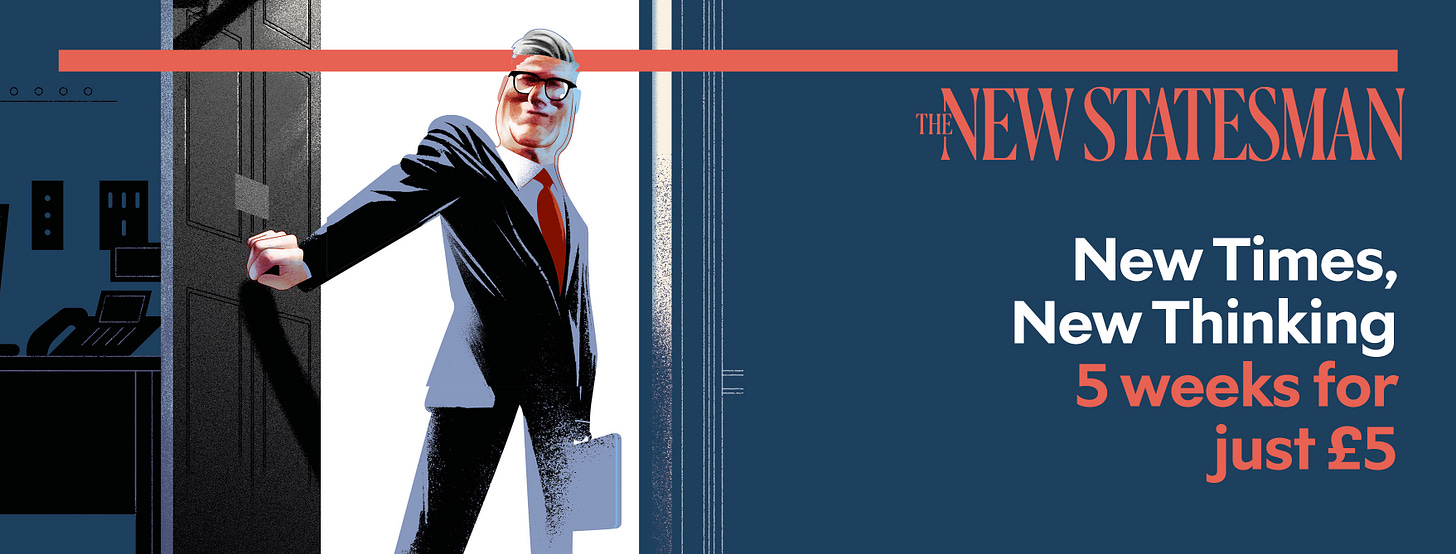Morning Call: Labour’s “old right” has been reborn
Keir Starmer’s new direction echoes his party’s past.
Good morning, it’s a pleasure to be back. Keir Starmer will meet Donald Trump for the first time since his election as US president today with a press conference due at 7pm UK time (Freddie will be covering it from Washington DC). Below I explore what Starmer’s landmark announcement on defence spending told us about his government’s political character.
To govern is to choose. Keir Starmer’s decision to raise defence spending and cut foreign aid was a politically defining one. It exemplified No 10’s willingness to demolish liberal-left shibboleths – on immigration and much else – as it adapts to a new era. Though Starmer announced the reduction in development spending from 0.5 per cent of GDP to 0.3 per cent with regret, this Downing Street knows that few voters will mourn it (64 per cent believe the UK spends too much on aid).
Starmer’s policy reflects contemporary factors: the darkening geopolitical landscape and Donald Trump’s second victory. But it has echoes in Labour history. Government aides recall Clement Attlee’s rearmament for the Korean war which prompted the introduction of NHS prescription charges (and the cabinet resignations of Harold Wilson and Aneurin Bevan).
Ernest Bevin, Attlee’s foreign secretary and the architect of Nato, has become something of a lodestar for Starmer and David Lammy. He was the pugnacious trade unionist who declared of the atomic bomb: “We’ve got to have the bloody Union Jack on top of it”.
There are parallels too with Denis Healey who as defence secretary argued in 1969: “Once we cut defence expenditure to the extent where our security is imperilled, we have no houses, we have no hospitals, we have no schools. We have a heap of cinders.” Healey was a titan of Labour’s “old right” – the pre-New Labour wing that triumphed over the hard left in the 1980s and whose figureheads have included Jim Callaghan, Tom Watson, Michael Dugher and John Spellar (a tribe centred around the West Midlands and Yorkshire).
Back in May 2015, during his deputy leadership campaign, Watson told me: “The expansionist aims of Vladimir Putin are a big threat to European stability. I think it’s inevitable that we will need a larger infantry and more naval capacity in years to come.” He also warned that free movement was “the biggest issue that undermines the authority and legitimacy of the European Union in the minds of voters”. A decade on, these contrarian old right positions have become the new common sense.
Starmer’s aversion to explicit ideology (“there is no such thing as Starmerism and there never will be”) has left commentators often struggling to locate his administration within Labour’s ideological universe. Some have seen the events of this week as further proof of the advance of Blue Labour, the group led by peer Maurice Glasman (which I explored here), but there’s also an old right flavour to this government. It is expanding workers’ rights, raising NHS spending and embracing hawkish stances on defence and immigration. This trajectory aligns it with the old right – which is both more economically interventionist and more socially conservative than New Labour (which often treated the unions as embarrassing relatives).
That’s the political space occupied by Rachel Reeves whose workerist Budget resembled those of Callaghan and Healey and whose support for Heathrow expansion and the Rosebank oil field is cheered by the unions. It’s no accident that her political secretary is Matt Pound, one of the mainstays of Labour First, the old right group, and a close ally of No 10 chief of staff Morgan McSweeney.
As MPs adjust to a changed political world, a succession of parliamentary groups have been launched including the Labour Growth Group, the vanguard of the government’s war on Nimbyism, Blue Labour, chaired by the former Socialist Campaign Group member Dan Carden, and the Red Wall group, which has pushed for stronger policies on immigration.
To this list a fourth can be added: Labour First, which was founded in 1980, has established a parliamentary network led by MPs Luke Akehurst, another trusted McSweeney ally, and Gurinder Singh Josan and Labour peers Spellar and Ruth Smeeth. “The left are still waiting in the wings to take advantage of any discord within the party,” it has warned and to date more than 50 MPs have signed up. As well as hosting parliamentary meetings and debates, the group aims to shield MPs from the threat of deselection in advance of the next election. Reeves, Defence Secretary John Healey (who has addressed Labour First meetings) and Home Secretary Yvette Cooper are seen as key allies.
Don’t expect Labour First to seek headlines of the kind recently made by Blue Labour – it has always preferred to operate in the shadows and has no desire to act as a policy thinktank. But the old right’s past and present help illuminate this government’s political character.
Starmer’s administration is populated by Blairites (or neo-Blairites): Pat McFadden, Wes Streeting, Peter Kyle, Liz Kendall, Jonathan Powell, Peter Mandelson and Liz Lloyd among them. But in a world transformed from that of 1997, it has charted a post-Blairite course.
Yet any expectation that Starmer would lead a liberal-left administration has been dispelled – he is tightening the borders, expanding Heathrow and cutting foreign aid – decisions that unsettle or enrage those progressives who thought the Prime Minister was one of them.
What to call a government that breaks with Blairism but that routinely disappoints the left? One in which the old right – playing a very long game – has won.
George’s picks
Andrew on how Starmer should handle Donald Trump.
Rachel interviews former Conservative chief whip Simon Hart on his revelatory diaries Ungovernable.
Finn interviews Ash Sarkar on her new book, Minority Rule, and the perils of identity politics.
Janan Ganesh on how the Tories have been forced to learn that geography still matters. (Financial Times)
Mailshot
Times: We need US security to hold back Putin, Starmer tells Trump
BBC: Andrew Tate and Tristan Tate leave Romania on jet bound for the US
Guardian: Hollywood legend Gene Hackman and wife Betsy Arakawa found dead at their home
i: Mortgages for over-55s up by a quarter as more people work past pension age
NYT: North Korea is sending more troops to Russia, South Korea says
George Monbiot: The question no one dares ask: what if Britain has to defend itself from the US?
Katy Balls: It’s time for Starmer’s Trump humiliation
Agnes Callard: The paradox of millennial perfection
Will Lloyd: Ash Sarkar’s misadventures in the culture war
Veronica Esposito: Michelle Trachtenberg’s natural talent shone in everything from Harriet the Spy to Buffy
And with that…
Let me know what you think about today’s Morning Call by hitting reply. My thanks to Chris Bourn and Megan Kenyon. Have a good day, Freddie will be with you tomorrow.
George — @georgeeaton








Amazing! George traipsed lightly through all of these purported Labour 'clans', without mentioning the 800lb gorilla in the room, the UK's naked aggression in the MENA and our all round support for the Gaza genocide and the development of 'Greater Israel' in the West Bank, Southern Syria and Lebanon (so far).
It may be supposed that war-hawks like Akehurst and Glasman (the only Labour representative to be invited to President Caligula's inauguration) will keep Starmer's nose to the mass-murder grindstone, even if the supposed 'human rights lawyer' hadn't so eagerly forgotten every single one of the Nuremberg Principles...
It may suit the commentariat to look at these imaginary Labour shibboleths as if they mean something to the ordinary voter, but they don't. Here are the facts:
1) Starmer is a fawning, cringing sycophant who will do what the nearest rich person tells him to; hence his love of Rupert Muroch, for instance. Does he really imagine the voters who are losing wealth and employment because of Brexit will care about higher defence spending, which will go to the Defence Industry anyway?
2) Vichy Labour is now the new Tory party - it has no cure for Brexit (which it chooses not to address) and will move further and further into its hard right pantomime (on migration, etc., jobs in the NHS) as Starmer's popularity crashes to new lows.
3) At the next election a horrific version of the Blackshirts will come to power (a Jenrick/Farage fusion, perhaps?) because Vichy Labour has not only done nothing but continues to show it will do nothing other than (a la David Lammy) file huge expenses claims and look for executive jobs outside politics.
4) Brexit? Shhhhh! Don't talk about it.
At last Labour has sloughed off the worn-out Marxism of the Corbyn days and adopted a realpolitik view of the world. We no longer have workers groaning and toiling under the heavy hand of Capitalism, and neither is there the cruel poverty of the early and mid-19th. Century. All citizens need protection from our enemies, both internal and external and Starmer as leader of a decent Labour Party can deliver this.